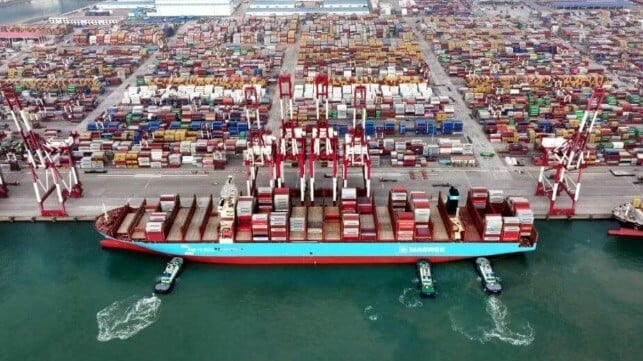Maersk has announced the successful reintegration of its inaugural methanol-converted container vessel into its fleet. The Maersk Halifax is currently on its final Asian port call before embarking on its maiden voyage post-conversion, crossing the Pacific to Mexico and Panama.

“Maersk is pleased to confirm that the Maersk Halifax has been successfully transformed into a dual-fuel methanol-powered ship. Post-sea trials, the vessel has resumed service, now catering to our clients on the Trans-Pacific route,” stated Leonardo Sonzio, Head of Fleet Management and Technology at Maersk.
The conversion, which took 88 days at the Zhoushan Xinya Shipyard in China, was finalized in late October 2024. Following sea trials last month, the vessel was officially handed over to Maersk on October 29. Departing from the anchorage on November 5, the ship made calls at Shanghai and loaded 5,532 TEUs of export containers at Qingdao Port, before stopping in Busan, South Korea. After a scheduled call in Yokohama, Japan, the Maersk Halifax is set to depart on November 20, with an expected arrival at APM Terminals Lazaro Cardenas on December 2.
This conversion was more intricate than others, being based on the 2017-built Maersk Honam, a Hong Kong class vessel constructed by Hyundai. Initially, the ship measured 1,158 feet (353 meters) in length with a capacity of 15,226 TEU. Tragically, Maersk Honam experienced a fire in 2018 that resulted in the loss of five crew members and significant damage to the forward section. The company opted to salvage the vessel, cutting it just behind the deck house and bridge, and attaching a new forward section. Re-entering service as the Maersk Halifax in April 2019.
The vessel arrived in China in July 2024 for a special survey and conversion. MAN Energy Solutions executed the engine conversion, which included replacing parts to enable methanol operation and adding new fuel tanks, a fuel preparation room, and a fuel supply system at the yard.
The hull was expanded to accommodate the new fuel tanks, extending the ship's length by 15 meters (49 feet) to 368 meters (1,207 feet), and increasing capacity from approximately 15,000 to 15,690 TEU. The new deadweight tonnage is listed at 185,000 tons for the Singapore-registered ship.
Maersk views this conversion as a learning opportunity as they aim to expand the use of methanol and other eco-friendly fuels. They plan to convert a sister ship due for a special survey in 2027, while MAN has been contracted for the potential conversion of all 11 vessels in the class.
“In the coming year, we will apply the insights gained from this first large-scale conversion,” Sonzio remarked. “Retrofitting existing vessels can be a vital alternative to new constructions in our transition from fossil fuels to low-emission fuels.”
Maersk continues to advance the deployment of its new dual-fuel methanol containerships. The fifth vessel, Alexandra Maersk, was named at Felixstowe in the UK at the start of October. A total of 18 large dual-fuel methanol vessels are scheduled for delivery in 2024 and 2025.
The demand for methanol dual-fuel containerships is growing, with DNV reporting that 22 are now in service, including Express Feeders' launch of smaller methanol feeder vessels in Northern Europe. Other companies, such as Hapag-Lloyd in collaboration with Seaspan and COSCO, have also contracted for the conversion of existing ships to dual-fuel configurations. DNV’s Alternative Fuels Insights database predicts a total of 218 methanol-fueled containerships to be delivered by 2030.
